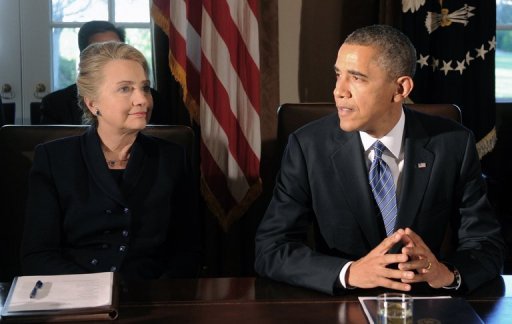Beyond the media fawning over the spectacle of President Barack Obama and outgoing Secretary of State Hillary Clinton sitting down for an interview together on 60 Minutes–old rivals, reunited!–there is a message that the president wants to send. Not just the fact that Vice President Joe Biden will not be his first pick for 2016, but also the signal that Republicans ought to forget about a revival in four years: liberalism is here to stay.
Republicans seem to have concluded that their overall revival depends on finding the right candidate to win. If so, they may be in for a long wait. Clinton is so popular right now–with Republicans as well as Democrats–that she is easily the favorite to win in 2016. Freshman Rep. Tom Cotton (R-AR) welcomed her during last week’s Benghazi hearings by telling her he had wished her to win the 2008 Democratic primary; even Paul Ryan suggested on Meet the Press that a President Clinton might have solved the debt crisis by now.
Clinton’s popularity is partly due to the fact that she is so different to Obama. She is not as hostile to opposition, and gives more direct-sounding answers to tough questions, even when she is being just as evasive. She once gave the impression of being more centrist, as well, famously voting in 2002 to authorize the Iraq War–a vote that her rival punished her for on the campaign trail in 2008, claiming he would have voted differently.
In truth, there is not much daylight between the Alinskyite pair. Clinton not only carried out the Obama administration’s awful foreign policy–she did so with enthusiasm. She lectured Israeli Prime Minister Benjamin Netanyahu for 45 minutes over construction in Jewish parts of Jerusalem, for example, and launched an abortive “reset” in relations with Russia (a gesture that failed even in its theatrics; the button read “overcharge”).
Obama and Clinton are also closely bound together in the Benghazi failure, a scandal whose details are still being kept from the public, even though it is broadly clear that the White House chose not to intervene to save U.S. personnel, and at the same time engineered a cover-up in which both Obama and Clinton agreed to a fraudulent alibi that blamed the deadly attack on an anti-Islam video on YouTube that few had seen.
Yet the two have avoided accountability, since the media failed to pursue the Benghazi scandal before the election (or actively suppressed it), and now that the election is long gone, most have adopted the “what difference does it make?” attitude displayed by Clinton on Capitol Hill last week. She ought to be haunted by those words, and those four dead Americans, for the rest of her career; chances are, however, that she will not.
Obama’s joint interview was likely planned as a gesture of support and unity as the Benghazi scandal returned–however briefly–to the headlines. Yet it also serves a political purpose for the president, as he moves forward with an aggressive and confrontational agenda designed to divide and marginalize opposition and lay the foundation for radical changes, not just for the next four years but the in years beyond.
President Obama wants Republicans to know that the left’s moment is not fleeting; that the changes he makes today will be ratified by the electorate, through Clinton, in 2016 and possibly 2020; in short, that there is no hope for a resurgence and they may as well yield. Whether he succeeds may depend less on how Republicans rebuild themselves, and more on whether Biden–and other Democrats–disrupt the Obama-Clinton alliance.

COMMENTS
Please let us know if you're having issues with commenting.